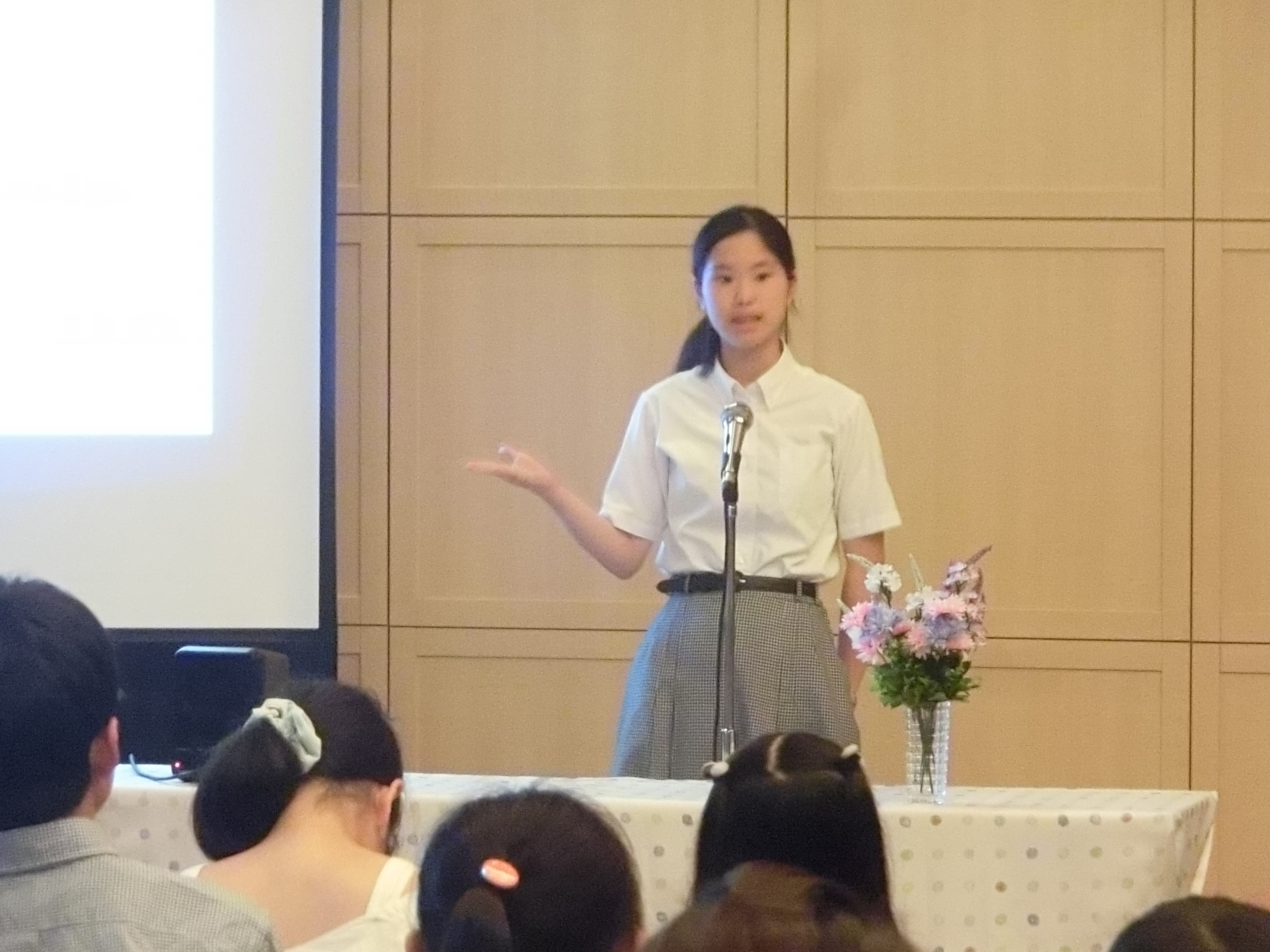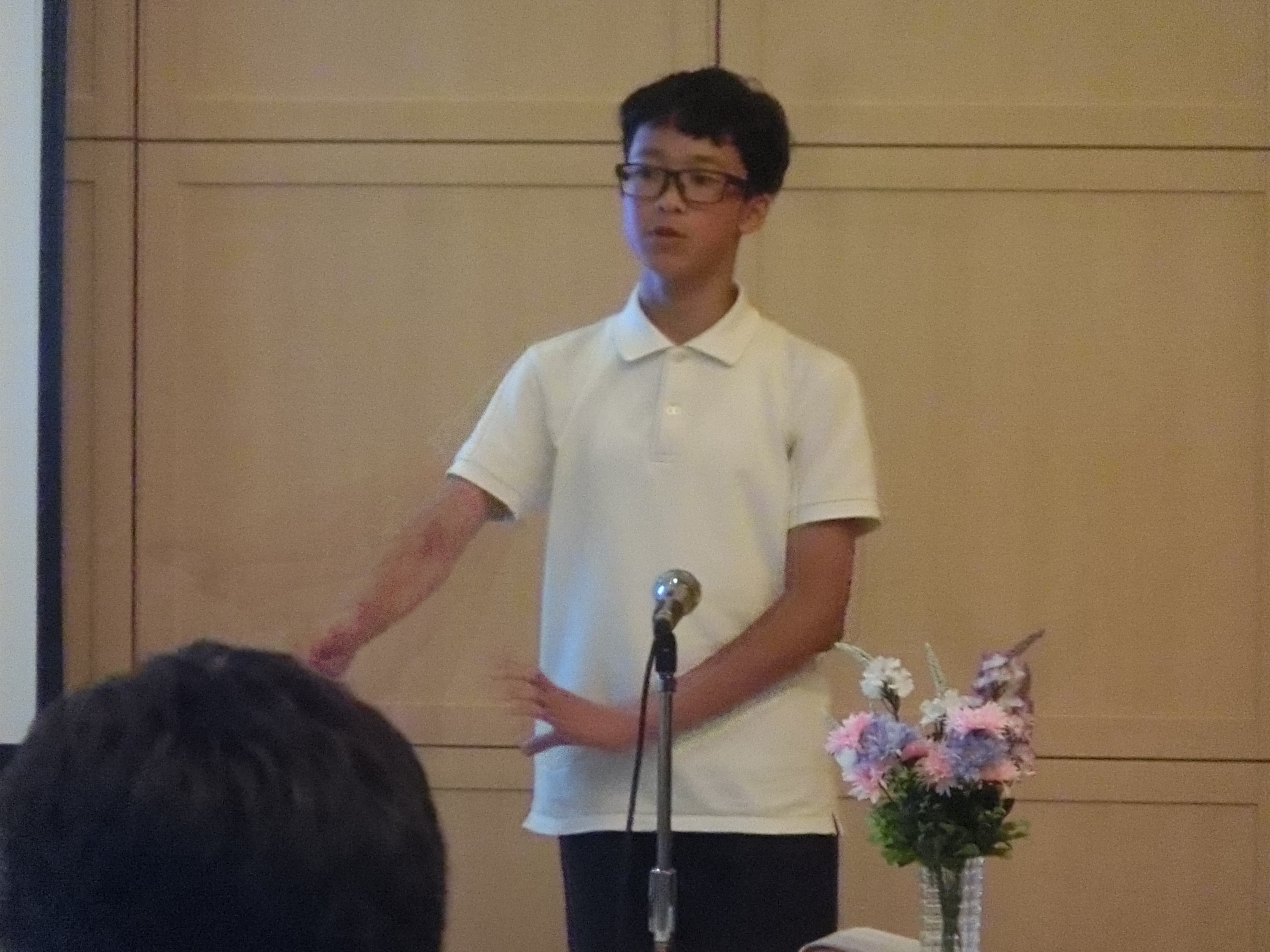
Global kids 英語会の中・高校生クラスでは、「ディベイト(Debate)」を授業の柱のひとつにしています。
特定のトピックに関して賛成派(Affirmative)と反対派(Negative)のグループにわかれ、観衆の前で交互に意見を述べて、白熱した議論を展開するディベイトは、アメリカで「言葉のスポーツ」と呼ばれています。
スポーツという印象から「勝ち負け」を目的とすると思われがちですが、ディベイトの真の目的は、特定の社会問題について賛成・反対双方の観点からよく吟味し、問題を相互的に深く共有することにあります。
当会の中・高校生のディベイトでは、様々な社会問題を議題に取りあげ、1学期間をかけて英語での活発な議論をくりかえしています。
たとえば、2018年の4月から7月にかけて行われたディベイトでは、「相撲における女人禁制の伝統」について賛成派・反対派に分かれて議論しました。
2018年4月の大相撲春巡業で、土俵での挨拶中に卒倒した男性市長を救助するため、素早く土俵に駆け上がった観客の女性たちに対し、場内アナウンスで「女性の方は土俵から降りてください!」と場内アナウンスを浴びせかける騒動が起こりました。この出来事は世界各国のメディアで大きく報じられました。
当会の中・高校生たちは、このニュースをきっかけに「相撲における女人禁制の伝統」について考え、日本の歴史や憲法などをひもときながら問題意識を深めていき、活発にディベイトを行いました。そして7月のプレゼン大会で、その成果を「ディベイト・ショー」という形式で発表しました。
下記、その論旨展開を簡単に日本語と英語にまとめましたのでご参照ください。

Resolved: Women should be admitted to sumo ring.
論題:「女性は相撲の土俵に入るのを許されるべきである。」
Affirmative (1) 相撲における女人禁制の伝統は、間違っているだけでなく、理不尽だ。女性力士は全国で1100人もいるという。地方巡業の際、男性市長同様、土俵に上がって挨拶したいという女性市長たちもいる。この相撲の伝統は、彼女たちの夢や希望を打ち砕く。いずれ女性の首相が誕生した時でさえ、相撲協会は女性だからといって土俵に上げないつもりなのか?これは、あきらかに女性差別である。
Blocking women from the sumo ring is not only wrong, but absurd. There are currently over 1100 female sumo wrestlers in Japan. The tradition of excluding women from the ring will shatter their dreams. There are female mayors who really would like to make opening speeches for local sumo matches. The sumo tradition hurts them too. And what will happen with a future female Prime Minister? Will the sumo association try to exclude even the Prime Minister because of her sex? The tradition is absolutely discriminatory against women.
↓
Negative(1) この事例は差別でない。単なる区別だ。例えば、宝塚歌劇団、お茶の水女子大のような国立女子大、女性専用車両など、逆に男性が入れない事例を見てほしい。果たしてこれらは、男性への差別だといえるだろうか?社会は必要に応じて女性と男性を分けている。相撲は国技であり、日本の文化的アイデンティティーだ。1300年の歴史のある相撲の伝統を簡単に変えるべきでない。
The tradition is not discrimination but rather just differentiation. Consider the examples of the Takarazuka theatrical group, National women’s universities like Ochanomizu University, and women’s only train cars. Do you think these cases are discrimination against men? We sometimes need to differentiate between women and men on a case by case basis. Sumo, which has 1300 years of history, is the national sport, and part of the cultural identity of Japan. Therefore, we shouldn’t throw it away so easily.
↓
Affirmative (2) 宝塚は男性の講師や振付師がおり、男性を排除していない。国立の女子大は現在でも男性と比べて大学進学率が低い女性をサポートするためであり、女性専用者は、痴漢防止策であり、相撲における女性排除とは意味が違い、正当な理由がある。この写真を見て欲しい。2017年秋に相撲協会は、フェラーリとその役員を土俵に上げている。これは、伝統に反していないのか?車を土俵に上げるなら、人間である女性をなぜ土俵に上げられないのか?相撲協会は伝統という言葉を、自分たちの都合が良いように利用しているだけである。
There are male instructors and choreographers in Takarazuka, which means it doesn’t completely reject men. And the aim of national women’s universities is to increase the percentage of women entering university, which is lower than that of men even now. Women only cars are to prevent sexual harassment in crowded trains. Each of these cases has a reasonable purpose to separate men and women. However, the tradition of sumo doesn’t. Take a look at this picture. Surprisingly, in 2017, Ferrari executives wearing shoes were allowed to enter the sumo ring at Ryougoku Kokkugikan. Why are women forbidden to do that? It’s clear that the Sumo Association is using the word “tradition” just for their convenience.
↓
Negative(2) 相撲はもともと、日本の土着の宗教である神道に由来する。古代より、相撲は、神道の祭り事、「神事」のひとつであった。憲法第20条において、宗教の自由は保障されており、儀式、行事などの宗教的行為の自由は担保されている。したがって、憲法20条に基づき、神事の一環である相撲における女人禁制のルールは、守られるべきである。
The traditions of sumo originate from the Shinto religion. In ancient times, sumo used to be a sort of ritual for the gods of Shinto, what we call 「神事」in Japan. That means sumo is not only tradition but a part of religion. Based on article 20 in the Japanese constitution, the freedom of religion is guaranteed. Therefore, the sumo rule should be maintained.
↓
Affirmative (3) 相手が憲法を取り上げるならこちらも憲法について言及する。日本国憲法は、第14条で、国民は男女の性別によって差別されないと明記している。よって相撲における女性排除の伝統は憲法違反にあたる。この伝統は、「男女は法の下において平等である」という、国際、、現代社会における普遍的人権意識とも乖離しており、日本は女性を差別する国であるというメッセージを世界に発している。人類の平等の方が、伝統の維持よりも優先されるべきである。
My opponents refer to Article 20 of the constitution, but in article 14, any discrimination by gender is prohibited. That means the sumo tradition is unconstitutional. The tradition violates international and modern common sense that women and men should be equal under the law. And it sends the message that Japan is the country that discriminates women to an international society. Human equality should be valued more than tradition.
↓
Negative(3)太古の歴史をたどると、もともと神道は女性崇拝の宗教だった。相撲は、女神を崇める祭りの一環であり、その背景は、女性蔑視とは全く逆だった。だからこそ日本を代表するフェミニストである平塚らいちょうは、「元始、女性は太陽だった」という名言を残したのだ。現代社会に合わないからといって、簡単に伝統を切り捨てるべきでない。伝統の由来をさぐり、その意味を把握し、読み変えるという試みをすべきである
Tracing back to ancient times, Shinto was a religion that revered many female gods. Sumo used to be a kind of performance to honor female gods and women. So historically, the tradition had quite the opposite meaning to the idea of discrimination against women. That’s why Hiratsuka Raicho, a prominent feminist, was quoted as saying, “ In ancient times, women used to be like the sun.” We should not ban tradition so easily, saying it doesn’t conform to modern society, but we should research and rediscover the value and the meaning of it.